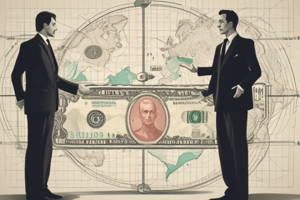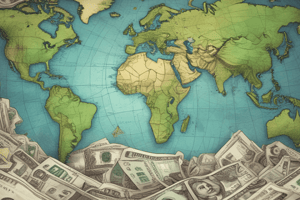Podcast
Questions and Answers
What does foreign trade refer to?
What does foreign trade refer to?
- Exchange of goods, services, and financial assets between individuals within a country
- Exchange of goods, services, and financial assets within a country
- Selling goods, services, and financial assets to foreign countries (correct)
- Buying goods, services, and financial assets from foreign countries
Which account in the Balance of Payments records transactions related to goods, services, income from investments, and unilateral transfers?
Which account in the Balance of Payments records transactions related to goods, services, income from investments, and unilateral transfers?
- Trade account
- Capital account
- Financial account
- Current account (correct)
How is the Balance of Payments (BoP) defined?
How is the Balance of Payments (BoP) defined?
- A record of domestic economic transactions within a country
- A financial statement showing a company's revenue and expenses
- A report detailing a country's government budget surplus or deficit
- A record of all economic transactions between a country and the rest of the world (correct)
What type of trade involves the purchase of goods, services, and financial assets from foreign countries?
What type of trade involves the purchase of goods, services, and financial assets from foreign countries?
How is foreign trade categorized based on whether goods are bought or sold?
How is foreign trade categorized based on whether goods are bought or sold?
What is the main purpose of the Balance of Payments?
What is the main purpose of the Balance of Payments?
How is a surplus on the balance of trade defined?
How is a surplus on the balance of trade defined?
What are some factors that can influence a country's Balance of Payments?
What are some factors that can influence a country's Balance of Payments?
How can foreign trade contribute to economic growth?
How can foreign trade contribute to economic growth?
What does the Balance on Current Account in the BoP represent?
What does the Balance on Current Account in the BoP represent?
Flashcards are hidden until you start studying
Study Notes
Understanding Foreign Trade and Balance of Payments
As globalization continues to shape our world, the intricate dance of foreign trade and its effects on economies cannot be overstated. One crucial tool used to measure and analyze this dance is the Balance of Payments (BoP). In this article, we'll delve into the basics of foreign trade and its BoP, shedding light on the concepts that shape international trade and its impacts on countries' economies.
Foreign Trade
Foreign trade refers to the exchange of goods, services, and financial assets between countries. It's a core component of a globalized economy, with nations trading to fulfill their needs, expand their economies, and improve their standards of living. Foreign trade can be categorized into two types:
- Export: The sale of goods, services, and financial assets to foreign countries.
- Import: The purchase of goods, services, and financial assets from foreign countries.
Balance of Payments
The Balance of Payments (BoP) is a record of all economic transactions between a country and the rest of the world in a specific time period, usually a year. It includes:
- Inflows (credits)
- Outflows (debits)
The BoP is broken down into three main accounts:
- Current account: Records transactions related to goods, services, income from investments, and unilateral transfers.
- Capital account: Records international transactions related to capital movements, such as foreign direct investment and portfolio investment.
- Financial account: Records transactions related to the buying and selling of financial assets and liabilities.
The BoP is reported in two basic forms:
- Statement of overall balances: Shows the balance of transactions in each account and their sum, which must equal zero.
- Balance on current account: The sum of the current account and net unilateral transfers.
Balance of Trade
The balance of trade is a sub-component of the current account in the BoP. It represents the difference between a country's exports and imports of goods and services. A surplus on the balance of trade indicates that a country is earning more from exports than it spends on imports, while a deficit means the opposite.
Factors Affecting the Balance of Payments
Several factors can influence a country's BoP, including:
- Exchange rates
- Inflation and interest rates
- Fiscal and monetary policies
- Consumer preferences and behaviors
- International trade agreements
- Natural disasters, political instability, and geopolitical tensions
- Changes in the terms of trade
- Currency speculation
Relationship between Trade and Economic Growth
Foreign trade can contribute to economic growth in various ways, such as:
- Increased productivity from specialization and comparative advantage
- Rising demand from foreign markets
- Increased competition that stimulates innovation and efficiency gains
- Technology transfer and knowledge spillover
- Improved access to raw materials and energy resources
Conclusion
Foreign trade and the Balance of Payments are critical components of international economics. By understanding these concepts, we can better comprehend the complexities of global trade and its impacts on domestic and international economies. The BoP not only provides a snapshot of a country's economic health but also serves as a barometer of its trading relationships with the rest of the world. This knowledge empowers us to make informed decisions about trade policy and to critically engage with global economic developments.
Studying That Suits You
Use AI to generate personalized quizzes and flashcards to suit your learning preferences.




